New EV Policy – Benefits for Electric Cars and Bikes
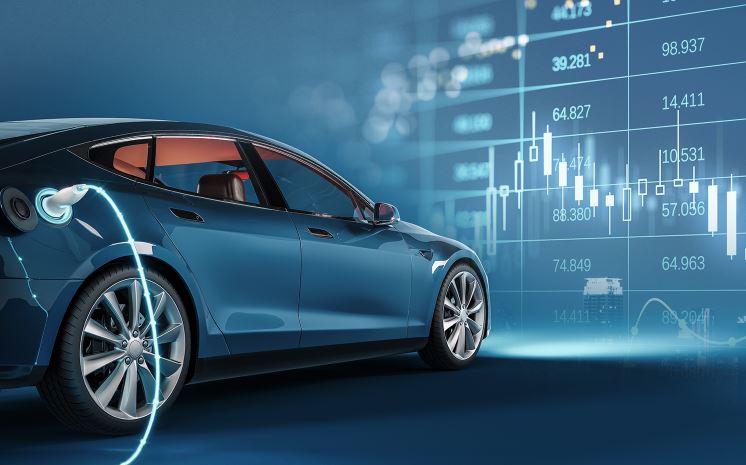
New EV Policy – Benefits for Electric Cars and Bikes
Pakistan is taking significant strides toward a greener future by promoting sustainable mobility. The goal is to increase the adoption of New Energy Vehicles (NEVs), aiming for 30% of new vehicle sales to be electric by 2030, 90% by 2040, and 100% by 2050. By 2060, Pakistan plans to achieve a 100% zero-emission vehicle fleet, marking a major step in the nation’s environmental commitment.
Key Features of the EV Policy
Substantial EV Subsidies:
The government is offering substantial subsidies for electric bikes (Rs. 50,000) and three-wheelers (Rs. 200,000) with a total budget of Rs. 4 billion. This is aimed at encouraging electric mobility and reducing dependence on fossil fuels.
Reduced Financing Costs:
The policy cuts financing rates from 22% to 15%, with a 3% Kibor rate, making EVs more affordable. Consumers will be able to pay in low monthly installments of around Rs. 9,000 over two years, which is less than what they would typically spend on fuel.
Infrastructure Development:
To support the transition, the government is establishing a New Energy Fund and a New Energy Vehicle Centre. These initiatives will enhance infrastructure and support the EV ecosystem.
Global Partnerships and Local Manufacturing:
International companies like BYD Group have obtained manufacturing licenses in Pakistan, and others, including Dewan Motors, are set to launch their EVs locally. This will foster the development of the electric vehicle industry in Pakistan.
Environmental Benefits:
The New EV policy is expected to reduce air pollution, cut greenhouse gas emissions, and lessen Pakistan’s reliance on expensive imported petroleum products, contributing to the country’s Nationally Determined Contributions (NDCs).
Incentives for CKD 2 & 3-Wheelers
The policy includes incentives for NEV 2- and 3-wheelers, offering reduced customs duties for localized parts. For new models, duties will gradually increase over the first three years. This will support local manufacturing and make electric bikes and scooters more affordable for consumers.
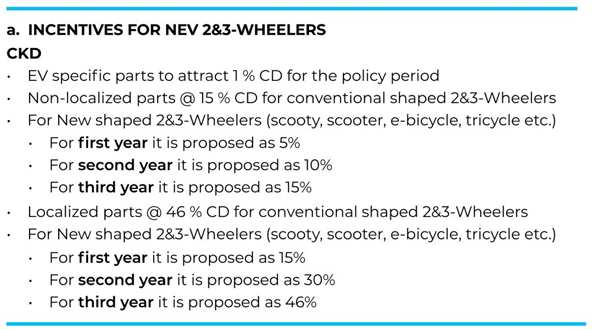
Incentives for CKD 4-Wheelers
The policy extends similar incentives to NEV 4-wheelers (cars, SUVs, vans, and light commercial vehicles). EV-specific parts will be subject to a 1% customs duty, and localized parts will attract reduced duties in the first two years.
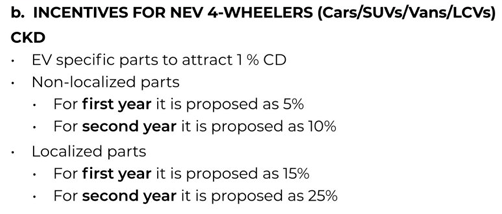
Heavy Commercial Vehicles and Storage Solutions
Incentives are also offered for NEV heavy commercial vehicles and related components. For storage solutions, the government is promoting the domestic production of batteries with a reduced customs duty of 1%, encouraging the development of Lithium-ion and other advanced battery technologies.

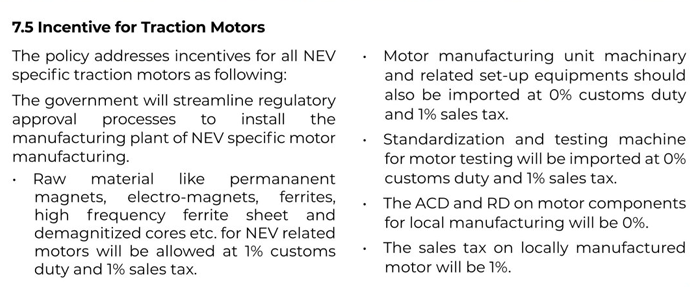
Traction Motors and Charging Infrastructure
The policy encourages the local manufacturing of traction motors, with reduced import duties on raw materials and machinery. Additionally, there are incentives for NEV chargers and battery swapping stations to ensure the infrastructure supports the growing number of electric vehicles.
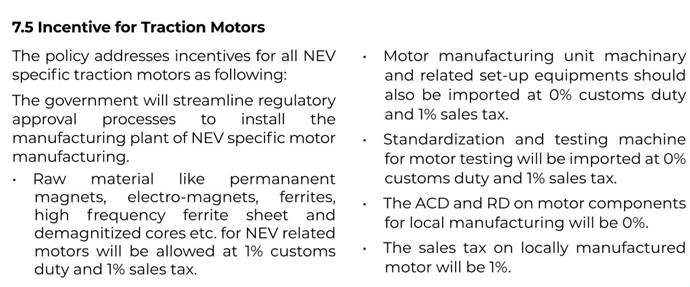
Objectives of the EV Policy
Promote Electric Vehicle Adoption: By offering incentives like EV tax benefits and subsidies, the policy aims to make electric cars and bikes more accessible to consumers.
Foster Sustainable Transportation: The policy aligns with global efforts for cleaner, greener mobility options and contributes to long-term environmental sustainability.
Encourage Public-Private Partnerships: The policy will facilitate collaboration with the private sector to innovate and drive the transition to electric mobility.
Reduce Long-term Import Dependence: By focusing on local production and reducing Pakistan's reliance on imported petroleum products, the policy aims to lower the country's import bills.
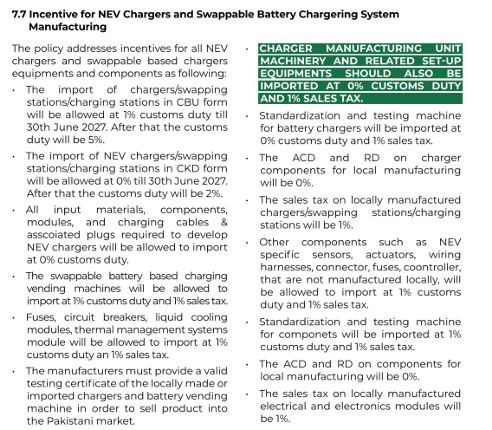
Industry Concerns
While the policy is a significant step toward sustainability, the Pakistan Automotive Manufacturers Association (PAMA) has raised concerns. They fear the increased import of CBUs at reduced duties might hurt local manufacturing. PAMA also recommends maintaining the hybrid vehicle policy until 2030 and aligning incentives for all types of NEVs.
Conclusion
Pakistan’s EV policy sets an ambitious roadmap for a greener future, with substantial incentives for electric mobility, such as subsidies and EV-specific tax benefits. It aims to promote electric vehicle adoption, reduce environmental impact, and stimulate local manufacturing, while addressing concerns raised by industry stakeholders. The success of the policy will depend on balancing environmental goals with the needs of the local automotive industry.
Electric car incentives
EV tax benefits
EV policy Pakistan
Electric bike incentives
Green vehicle policy
EV subsidies
Electric vehicle adoption
Sustainable transportation policy
Electric mobility benefits
EV policy for consumers
Related Auto News Updates
Latest Discussions
Comments
















Add a Comment "New EV Policy – Benefits for Electric Cars and Bikes"